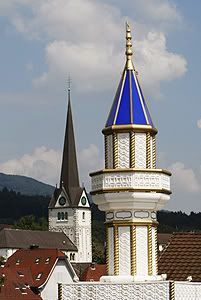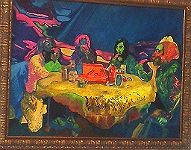 |
Wangen bei Olten, Switzerland
Real Clear Politics had an article up today on the minaret ban in Switzerland, written by Mathieu von Rohr in Spiegel Online. Despite its clearly disapproving tone, reading between the lines of this piece brings out some interesting points.
Firstly, von Rohr calls this popular ban of minaret-building a "symbolic vote" by the "organizers of the campaign [who] managed to turn the dispute over minarets into a symbolic referendum on the influence of Islam," where "they did not speak much about minarets. Instead, they talked about Sharia law, burqas and the oppression of women in the Islamic world."
Von Rohr quotes Ulrich Schlüer of the Swiss People's Party (SVP):
Minarets are "symbols of power" of a foreign religion, argued politician Ulrich Schlüer, who belongs to the SVP's right wing. The ban, he said, represents a clear statement against their spread.Well, of course, the ban of minarets is a huge symbolic message for the refusal of other Islamic influences on the country.
But, here is the real surprising bit of information. Von Rohr writes:
The debate was largely divorced from the reality of Switzerland. Although around 22 percent of the population is of foreign origin, the country has so far had relatively few problems with its roughly 400,000 Muslims. Most of them are liberally minded Bosnians, Kosovo Albanians and Turks and their approximately 160 mosques are practically invisible. Burqas are seldom seen on Swiss streets and there have never been serious calls for the introduction of Sharia law.Switzerland, rather than wait like many other European countries for Muslims to ingrain themselves into the fabric of the society, made a decisive and symbolic move to cut off Islam as close to its bud as possible.
Actually, it is the Swiss people who made this decision. If it had been left to the elites and politicians, sacrosanct words and phrases like "tolerance" and "freedom of religious expression" would have got tangled up in the rhetoric. Instead, ordinary people, who based their vote on their real-life experiences of frightening changes taking place in their own backyards, were able to take matters into their own hands.
That is why I say that ordinary people are ready for true, unafraid leaders. They - we - are the ones that directly suffer the consequences of these changes: in our streets, our shops, our jobs and our neigborhoods. Wilders knows this, and certainly the leaders of the Swiss SVP party know this.






